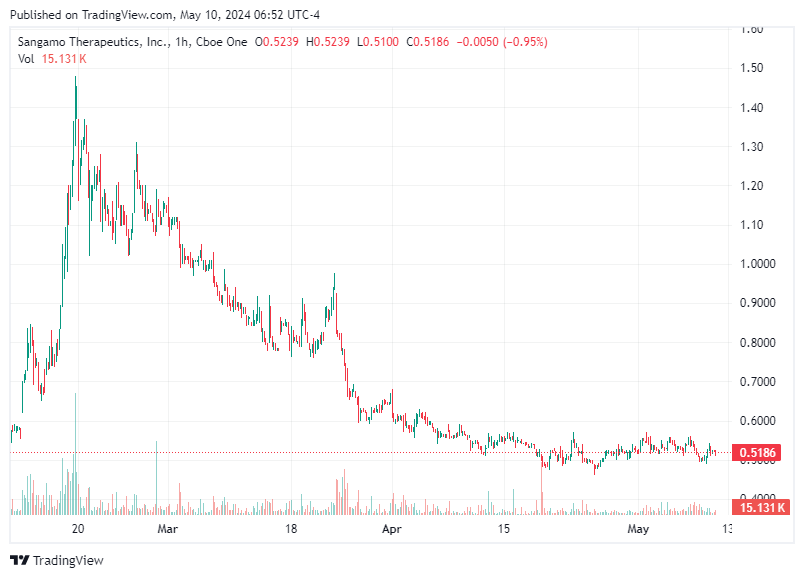Therapeutics Company Reveals Pre-clinical Data For Integrase Technology
The MINT platform, derived from Sangamo's extensive experience in protein-DNA interactions through its zinc finger technology.

As an investor it's important to stay updated with major news. Get real-time stock market alerts, news, and research by creating an account here.
Sangamo Therapeutics recently presented critical pre-clinical data on its innovative next-generation integrase technology, the Modular Integrase (MINT) platform, highlighting a significant advancement in the field of genome editing. The announcement came as part of their participation at the 27th American Society of Gene & Cell Therapy (ASGCT) Annual Meeting, emphasizing the potential of this technology to revolutionize treatments for patients with unique mutations within the same gene.
The MINT platform, derived from Sangamo's extensive experience in protein-DNA interactions through its zinc finger technology, uses Bxb1 variants to precisely integrate large DNA sequences into the genome. This addresses a previously challenging aspect of genomic medicine by enabling the insertion or replacement of entire genes with a single treatment. Greg Davis, Ph.D., Head of Technology at Sangamo, highlighted the significance of this development, pointing out its potential to expand treatment options across various indications by overcoming traditional barriers in DNA integration. A key attribute of the MINT platform is its versatility and compatibility with different delivery systems such as adeno-associated virus (AAV), lentiviral, and lipid nanoparticle (LNP) technologies. It is designed to operate without causing double-stranded DNA breaks or relying heavily on the cell's DNA repair mechanisms, thus minimizing the risk of translocation. Early pre-clinical results show promising levels of on-target integration, which could have broad implications not only for human disease treatment but also in the agricultural biotechnology sector.
Sangamo's approach, leveraging the compact, protein-guided integrases, underscores the company's commitment to developing safer and more efficient genomic medicines. The presentations by Sebastian Arangundy and Friedrich Fauser at the ASGCT meeting, along with the publication of a manuscript titled “Systematic Development of Reprogrammed Modular Integrases Enables Precise Genomic Integration of Large DNA Sequences” in bioRxiv by Jeff Miller and team, serve as key disseminations of their findings. These developments mark an exciting step forward in the application of genome editing technologies, potentially offering new avenues for therapeutic interventions and collaborations within the scientific community.
Sangamo Therapeutics is a genomic medicines company focused on developing therapeutic solutions using its proprietary genome editing and gene regulation technology. Their work spans multiple areas, including gene therapy, genome editing (such as with their zinc finger nuclease technology), and gene regulation, aiming to treat genetic conditions by addressing the root cause at the DNA level.
Modular Integrase Technology
The Modular Integrase (MINT) technology is an advanced genome editing platform designed by Sangamo. It leverages engineered integrases from Bxb1 serine recombinase to enable the targeted integration of large DNA sequences into the genome. This technology aims to offer a safer alternative to other genome editing methods that rely on creating double-stranded breaks in the DNA, which can lead to off-target effects and genomic instability. The MINT platform is intended to integrate therapeutic genes accurately and efficiently, without the need for breaking DNA strands, thereby potentially reducing risks associated with genomic editing.
Who and What Does This Impact?
Patients: The MINT technology has significant implications for patients suffering from genetic disorders, particularly those where treatment requires the insertion or replacement of large genes.
Research and Development: It opens new avenues for research in genetic diseases, providing a tool for precise genetic engineering that could facilitate the development of novel treatments.
Agricultural Biotech: Beyond human health, this technology could also have applications in agricultural biotechnology, enabling the development of genetically modified crops with beneficial traits.
Potential Impact on Sangamo and Its Stock
Market Positioning: This announcement could bolster Sangamo's reputation as a leader in genome editing technologies, attracting investor attention.
Strategic Partnerships: The innovation may foster collaborations with other companies or research institutions, potentially bringing in additional revenue or sharing the cost of development.
Regulatory Advantages: The promise of a safer, more precise genome editing method might lead to regulatory advantages, including expedited review processes for therapies developed with this technology.
Investor Confidence: Success in developing and commercializing products based on the MINT platform could significantly enhance investor confidence, potentially boosting the stock price. However, it's important to note that the biotech sector is highly volatile, and stock movements can be influenced by a range of factors, including clinical trial results, regulatory decisions, and market sentiment.
When looking at growth stocks in the American therapeutics sector, investors should focus on companies that show strong potential in innovative treatments, possess robust pipelines, and demonstrate strategic foresight in addressing unmet medical needs. Potential companies to watch include:
CRISPR Therapeutics (CRSP): Known for its pioneering work in CRISPR/Cas9 gene-editing technology, offering potential in treating genetic disorders.
Moderna (MRNA): A leader in mRNA technology, which proved instrumental in COVID-19 vaccines and is exploring other vaccine and therapeutic applications.
Vertex Pharmaceuticals (VRTX): Has made significant advances in treating cystic fibrosis and is expanding its pipeline into other areas.
Alnylam Pharmaceuticals (ALNY): A front-runner in RNA interference (RNAi) therapeutics, offering a new class of medicines.
BioNTech (BNTX): While headquartered in Germany, BioNTech trades on the NASDAQ and is notable for its role in developing a leading COVID-19 vaccine, with ongoing ventures in personalized cancer vaccines and other mRNA-based therapies.
These companies represent a cross-section of the biotech industry's diversity, each with unique technologies and therapeutic focuses that could drive growth in 2024. Investments in this sector require careful consideration of the inherent risks and the potential for significant rewards.

